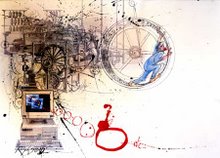Rochester City School District officials have voiced their support for the use of Ebonics, or Black English vernacular (BEV), as a classroom learning tool in the Winter '07 issue of the Diversity Dialogue newsletter distributed to staff.
The newsletter was authored by Michelle Hancock, RCSD Chief of Diversity and Leadership, and Tyra Webb-Johnson, Director of Coaching and Leadership.
According to the letter, to implement BEV in the classroom teachers can:
- Model standard English as part of formal speech in the class (shouldn't this be common practice anyway?)
- Switch into BEV during informal discussion
- Discuss features that differ in BEV and Standard English
Now, on top of the dozens of other responsibilities piled on our educators, teachers must be "bilingual" and proficient in a language that does not even exist. The newsletter frequently refers to BEV as a second language, I was unaware that there is a land of Ebonia where everyone speaks Ebonics.
Spanish is a second language, French is a second language, Ebonics is a joke and a travesty. Languages are based on form and structure with rules that apply based on situation and context, not which Chingy song is in the Top 40 this week.
By validating these so-called speech patterns the RCSD does nothing to assimilate the section of society that uses BEV. Rather than working to motivate individuals to develop skill sets that will make them successful in the predominant culture, such policies only enforce the status quo which has created the rift that produced these differences in socio-economic standing resulting in something like Ebonics.
How can a middle-class white guy with a private college English and Lib Arts degree formulate such an opinion? Well, I didn't really. I had always been on the fence on this issue until I read Richard Rodriquez's novel Hunger of Learning. As the child of immigrant parents Mr. Rodriguez lived this issue and his views on bilingual education are illustrated in a Time magazine article:
In the book, Rodriguez bears knowledgeable and compelling witness against America's recent methods of educating the underprivileged, and especially against bilingual education.
Rodriguez, in fact, is his own best case history. "I have been haunted by how my education has made me different," he says. As a "socially disadvantaged" son of Spanish-speaking parents, he entered a Roman Catholic grammar school in Sacramento, Calif., when he was six, speaking barely 50 words of English. By day, in class, he sat silent and unlearning. At night he luxuriated in the warmth and intimacy of his family's Spanish language and the separate, private world of his home. It was only when his teachers finally prevailed on Rodriguez's parents to try speaking English at home that his education began.
-snip-
Rodriguez has scant patience with middle-class ethnics, "filled with decadent self-pity," who resist entering the mainstream of American life. Today's bilingual classes, he maintains, keep children "poised at the edge of language too long." Using black English or Spanish in school is crippling because it reduces learning and delays assimilation; hence it reinforces a public form of separateness, a distinction that ultimately keeps minorities in their ghettos. "What I needed to learn in school was that I had the right—and the obligation—to speak the public language of los gringos," writes Rodriguez. "Only when I was able to think of myself as an American, no longer an alien in gringo society, could I seek the rights and opportunities necessary for full public individuality."
-snip-
"I've always been in favor of affirmative action, but only if class was the criterion rather than race."
What can students do, according to the newsletter, to help this program:
- Analyze the way black characters (their words not mine) deliberately alter speech patterns in media
- Create a list of BEV expressions and translate them into Standard English
Oh, oh . . . I have one. Whack, as in stupid, pointless or f-ed up.










1 comment:
Aside from the substance of this controversy, this also points out one of the main failings of inner-city education: the stifling bureaucracy. "Chief of Diversity and Leadership" and "Director of Coaching and Leadership" - those titles speak for themselves.
Post a Comment